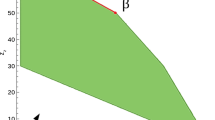Abstract
Given a setΩ ofR n and a functionf fromΩ intoR n we consider a problem of finding a pointx * inΩ such that(x−x *)t f(x *)≽0 holds for every pointx inΩ. This problem is called the stationary point problem and the pointx * is called a stationary point. We present a variable dimension algorithm for solving the stationary point problem with an affine functionf on a polytopeΩ defined by constraints of linear equations and inequalities. We propose a system of equations whose solution set contains a piecewise linear path connecting a trivial starting point inΩ with a stationary point. The path can be followed by solving a series of linear programs which inherit the structure of constraints ofΩ. The linear programs are solved efficiently with the Dantzig-Wolfe decomposition method by exploiting fully the structure.
Similar content being viewed by others
References
Dafermos S (1980) Traffic equilibrium and variational inequalities. Transportation Science 14:42–54
Eaves BC (1978) A short course in solving equations with PL homotopies. SIAM-AMS Proceeding 9:73–143
van den Elzen AH, Talman AJJ (to appear) A procedure for finding Nash equilibria in bimatrix games. Z Operat Res
Hearn DW, Lawphongpanich S, Ventura JA (1985) Finiteness in restricted simplicial decomposition. Operat Res Letters 4:125–130
von Hohenbalken B (1975) A finite algorithm to maximize certain pseudoconcave functions on polytopes. Math Progr 8:189–206
von Hohenbalken B (1977) Simplicial decomposition in nonlinear programming algorithms. Math Progr 13:49–68
Kinderlehrer D, Stampacchia G (1980) An introduction to variational inequalities and their applications. Academic Press, New York
Kojima M (1980) An introduction to variable dimension algorithms for solving systems of equations. In: Allgower EL, Glashoff K, Peitgen H-O (eds) Numerical solution of nonlinear equations. Lecture Notes in Math 878. Springer, Berlin, pp 199–237
Kojima M, Kaneko I (1978) A unified parametric quadratic programming solutions to some stochastic linear programming models. Technical Summary Report No 1893. University of Wisconsin-Madison
van der Laan G, Talman AJJ (1979) A restart algorithm for computing fixed points without an extra dimension. Math Progr 17:14–84
Lawphongpanich S, Hearn DH (1984) Simplicial decomposition of the asymmetric traffic assignment problem. Transportation Research 18B:123–133
Markowitz HM (1987) Mean-variance analysis in portfolio choice and capital market. Basil Blackwell, New York
Nguen S, Dupuis C (1984) An efficient method for computing traffic equilibria in networks with asymmetric transportation costs. Transportation Sci 18:184–202
Pang JS, Chan D (1982) Iterative methods for variational and complementarity problem. Math Progr 24:284–313
Pang JS, Yu C-S (1984) Linearized simplicial decomposition methods for computing traffic equilibria on networks. Networks 14:427–438
Sacher RS (1980) An algorithm for large scale convex quadratic programming. Math Progr 18:16–30
Shetty CM, Mohammed Ben Daya (1988) A decomposition procedure for convex quadratic programs. Naval Research Logistics 35:111–118
Smith MJ (1979) The existence, uniqueness and stability of traffic equilibria. Transportation Res 13B:295–304
Stoer J, Witzgall C (1978) Convexity and optimization in finite dimensions I. Springer, Berlin
Talman AJJ, Yamamoto Y (1989) A simplicial algorithm for stationary point problems. Math Operat Res 14:383–399
Yamamoto Y (1987) A path following algorithm for stationary point problems. J Operat Res Soc Japan 30:181–198
Yamamoto Y (1989) Fixed point algorithms for stationary point problems. In: Iri M, Tanabe K (eds) Mathematical programming, recent developments and applications. Kluwer Academic Publ, Dordrecht, pp 283–307
Author information
Authors and Affiliations
Additional information
Part of this research was carried out when the first author was supported by the Center for Economic Research, Tilburg University, The Netherlands and the third author was supported by the Alexander von Humboldt-Foundation, Federal Republic of Germany.
Rights and permissions
About this article
Cite this article
Dai, Y., Sekitani, K. & Yamamoto, Y. A variable dimension algorithm with the Dantzig-Wolfe decomposition for structured stationary point problems. ZOR Zeitschrift für Operations Research Methods and Models of Operations Research 36, 23–53 (1992). https://doi.org/10.1007/BF01541030
Received:
Revised:
Issue Date:
DOI: https://doi.org/10.1007/BF01541030


